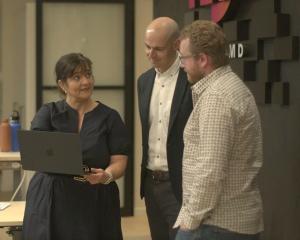
David Darling was talking about the "strong need" for more research and development businesses in New Zealand.
Next month, he will retire from his long-held role as chief executive of Pacific Edge, handing over the reins to medical business executive Dr Peter Meintjes.
In 2002, Mr Darling was recruited to lead the Dunedin-based cancer diagnostics company a year after it was founded at the University of Otago.
Nearly 20 years later, it is still Dunedin-based but has more than 80 staff across four countries, 6000 shareholders, is dual listed on the NZX and ASX and has a market capitalisation of just over $1billion.
He came to the role after founding forestry biotechnology business ArborGen for the Fletcher Challenge Group.
With the success that Pinus radiata was having in New Zealand’s forestry industry, Mr Darling was trying to find other species of pine tree that would work with the country’s geography.
It was in that role he spent lengthy periods of time travelling to and working in North and South America and Southeast Asia based from the Bay of Plenty’s Ohope Beach.
After spending two decades with the Fletcher Challenge Group, Mr Darling was shoulder-tapped to lead newly formed Pacific Edge in Dunedin.
"According to my wife it was only going to be for three years but it has turned out to be 19 years," he said.
Under Mr Darling’s leadership, Pacific Edge has built and developed Cxbladder products designed for non-invasive tests for bladder cancer.
He believed the tests had been "disruptive" for the industry, with urologists changing their practice for the better after adopting CxBladder.
One of the most enjoyable parts of his job was hearing the success stories that had been created from CxBladder.
"We turn up here every day and literally make a difference to people’s lives so it doesn’t get much better than that," he said.
Being able to run an international business from Dunedin had been "phenomenal".
The nature of having a global company in New Zealand meant he had to spend a lot of time away from Dunedin.
Despite the country’s borders being closed for the better part of the past two years, Mr Darling believed the company had been able to rely on the "relationships of trust" it had built with stakeholders in the past.
"If I’ve learnt anything, it would be people don’t care where you come from, you just have to prove yourself to them," he said.
Deciding to stand down from Pacific Edge had been in the plans for a while but it was a matter of timing.
After a successful year in 2020, following the signing of two major deals in the United States, Mr Darling gave his notice to the board in April this year.
He wanted to get the company to a point where he could say it had been a success.
"I didn’t ever want to step down and retire and be the guy who didn’t quite get there. I wanted to be known as the guy who got there," he said.
Mr Darling officially stands down as chief executive on January 10 but would be staying on full time to help with the transition until April 6.
After that, he will be contracted to Pacific Edge for the next two years for when the company needed him.
Retirement would not be quiet for Mr Darling as he planned to help other younger research and development companies in New Zealand with their ideas.
"I’ve learnt a lot over the past 20 years and there is a lot I can do to help them," he said.
New Zealand was a fantastic place to start up a global company like Pacific Edge but it was a matter of harnessing those ideas.
"I’m sure all of that will keep my brain active enough," he said.
Outside of working, Mr Darling planned to spend time hunting and fishing.
"I have plenty to do," he said.












